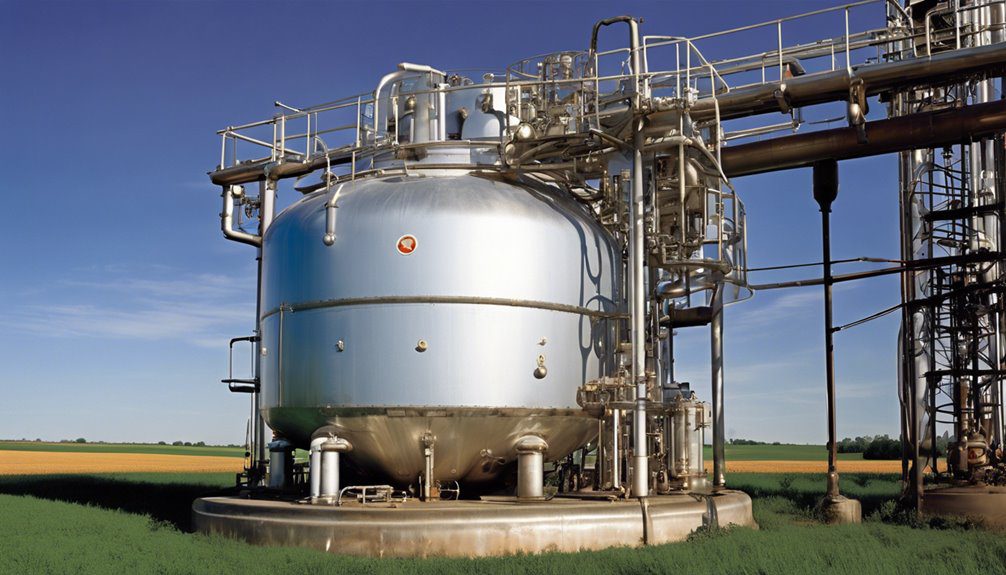When you're involved in the distribution of anhydrous ammonia in Tennessee, understanding the bond requirements is essential for your business. This bond not only protects you against potential liabilities but also enhances your credibility in the market. You might wonder what specific regulations you need to comply with or how the application process works. As you navigate these requirements, the implications for your financial health and operational success can become clearer, especially if you consider the risks of operating without this critical safeguard. Exploring these factors could reveal more than you initially anticipated.
Understanding Anhydrous Ammonia

Although you might be familiar with ammonia as a household cleaning agent, anhydrous ammonia is quite different. This colorless gas, primarily composed of nitrogen and hydrogen, is used predominantly in agriculture as a fertilizer. Unlike the ammonia you use at home, anhydrous ammonia has a much higher concentration of nitrogen, making it an effective nutrient source for crops.
When you handle anhydrous ammonia, you need to understand its properties. It's stored under pressure as a liquid, and when released, it quickly vaporizes into a gas. This rapid transformation can create a chilling effect, which is why you must take safety precautions when working with it.
In agriculture, you'll find that anhydrous ammonia is injected into the soil, where it reacts with moisture to form ammonium, a form that plants can easily absorb. Its application can significantly enhance crop yields, making it a popular choice among farmers.
Understanding these characteristics not only helps you appreciate its role in farming but also highlights the need for proper handling practices to ensure safety and efficiency in its use.
Importance of the Bond
The bond for handling anhydrous ammonia is crucial for ensuring safety and compliance in agricultural practices. By securing this bond, you're not only protecting your business but also safeguarding the environment and community.
Anhydrous ammonia is a powerful fertilizer that, if mishandled, can pose serious risks, including health hazards and environmental damage. When you obtain this bond, you demonstrate a commitment to responsible management and adherence to regulations.
It shows that you're prepared to mitigate potential risks associated with the use of this chemical. This bond serves as a financial assurance, ensuring that funds are available to cover any damages or liabilities that may arise from accidents or improper handling.
Moreover, having the bond enhances your credibility with suppliers, customers, and regulatory agencies. It signals that you take your responsibilities seriously, which can lead to better business relationships and opportunities.
In essence, the bond isn't just a legal requirement; it's a vital step toward fostering a culture of safety and accountability in your operations. Prioritizing this bond helps you navigate the complexities of using anhydrous ammonia effectively and responsibly.
Bond Requirements in Tennessee

In Tennessee, specific bond requirements must be met for those handling anhydrous ammonia. As a dealer, you're required to secure a bond that ensures compliance with state regulations and protects consumers and the environment.
This bond acts as a financial guarantee that you'll adhere to all applicable laws regarding the storage and distribution of anhydrous ammonia.
The bond amount typically aligns with the volume of anhydrous ammonia you plan to handle. You should expect the required amount to be in the range of $10,000 to $25,000, but it's crucial to verify the exact figure based on your operations.
Make sure your bonding company is licensed to operate in Tennessee and has a good reputation.
Additionally, you'll need to provide proof of insurance, which further safeguards against potential liabilities. This insurance should cover any damages that could arise from your activities related to anhydrous ammonia.
Application Process for Dealers
Navigating the application process for becoming a dealer in anhydrous ammonia requires careful attention to detail.
First, you'll need to gather essential documents, including your business license, proof of insurance, and any relevant permits. Ensure these documents are current and comply with Tennessee regulations.
Next, you'll fill out the application form specific to anhydrous ammonia dealers. This form typically asks for information about your business structure, ownership, and operational plans. Make sure to provide accurate and complete information to avoid delays.
After submitting your application, you'll likely undergo a background check. This step is crucial, as it helps assess your eligibility to handle potentially hazardous materials. Be prepared to answer any follow-up questions from regulatory agencies.
Once your application is approved, you'll need to secure the appropriate bond, which serves as a financial guarantee for compliance with state regulations. License and permit bonds ensure that your business adheres to the necessary laws and regulations.
Keep in mind that maintaining your dealer status may require periodic renewal of your bond and licenses.
Stay organized and proactive throughout this process to ensure a smooth application experience. Following these steps will set you on the path to successfully becoming an anhydrous ammonia dealer in Tennessee.
Compliance and Regulatory Standards

Compliance with regulatory standards is crucial for anyone looking to operate as an anhydrous ammonia dealer in Tennessee. You must adhere to both state and federal regulations to ensure safe handling and distribution of this fertilizer. The Tennessee Department of Agriculture outlines specific guidelines that you need to follow, including proper storage, labeling, and employee training.
You'll also need to comply with the Environmental Protection Agency (EPA) regulations, which mandate safety protocols for the use of anhydrous ammonia. This includes maintaining appropriate safety data sheets (SDS) and implementing risk management plans if your operations exceed certain thresholds.
Furthermore, regular inspections and audits will ensure you're meeting these standards. It's essential to keep accurate records of all transactions, safety training, and inspections. Failing to comply can lead to significant penalties, including fines or the suspension of your operating license.
Stay informed about any changes in regulations, as they can impact your business practices. Regularly participating in training and workshops can help you maintain compliance and foster a safe working environment.
Ultimately, prioritizing compliance safeguards your business and the community at large.
Financial Implications of the Bond
When considering the financial implications of securing a bond as an anhydrous ammonia dealer in Tennessee, you'll find that the costs can vary based on several factors. The bond amount typically depends on your business size and the volume of ammonia you plan to handle. Generally, higher volumes require larger bonds, which can lead to increased costs.
You also need to account for the premium you'll pay to the bonding company. This premium is usually a percentage of the total bond amount and can range from 1% to 15%, depending on your creditworthiness and the company's assessment of risk. If you have a strong credit history, you might secure a lower premium, which can significantly affect your overall expenses.
Additionally, consider any renewal fees or administrative costs associated with maintaining the bond. These ongoing fees can add up over time, impacting your budget.
Ultimately, while the bond represents an upfront financial commitment, it serves as a critical safeguard for your business, ensuring compliance and fostering trust with customers and regulators alike. Balancing these costs against the potential benefits is essential for making an informed decision.
Risks of Operating Without the Bond

Operating without the required bond as an anhydrous ammonia dealer can frequently lead to significant legal and financial risks. If you choose to operate without this bond, you expose yourself to potential lawsuits and regulatory penalties.
State regulatory bodies may impose fines or revoke your operating license, jeopardizing your business's future.
Moreover, without the bond, you're not providing any financial assurance to your customers. This lack of protection can deter clients from doing business with you, fearing that they won't be compensated for any damages or losses that may occur due to your operations.
In case of an accident or environmental damage, the financial repercussions can be devastating. You may find yourself personally liable for damages, which can lead to hefty out-of-pocket expenses that threaten your business viability.
Additionally, your reputation in the industry can suffer. Customers and partners may view you as unreliable or untrustworthy, making it difficult to attract new business.
Ultimately, the risks of operating without the bond far outweigh any perceived savings. Protecting your business, your clients, and your reputation is crucial in this competitive market. Furthermore, obtaining the bond ensures compliance with state laws and provides an additional layer of security for your operations.
Tips for Successful Bond Management
Successfully managing your anhydrous ammonia bond requires a proactive approach to ensure you're meeting all regulatory requirements while protecting your business interests.
Start by keeping detailed records of your bond and all transactions related to anhydrous ammonia. This not only helps you stay organized but also simplifies compliance audits.
Stay updated on federal and state regulations regarding anhydrous ammonia. Regularly check for changes that could affect your bond obligations. Joining industry groups or forums can be beneficial for sharing insights and staying informed.
Next, review your bond coverage periodically. Ensure it's adequate for your business size and risk profile. If your operation expands, consider increasing your bond amount accordingly.
Additionally, communicate with your bonding company. Establishing a good relationship can provide you with valuable support and guidance. Don't hesitate to reach out if you have questions or need clarification on any bond-related issues.
Lastly, conduct regular training for your employees on safety and compliance procedures. This not only minimizes risks but also reinforces a culture of accountability within your business. Understanding the requirements for surety bonds is essential for maintaining compliance and protecting your interests.
Conclusion
In conclusion, securing a Tennessee Dealer in Anhydrous Ammonia Bond is essential for your business. It not only protects you from potential liabilities but also boosts your credibility with customers and regulators. By understanding the bond requirements and maintaining compliance with safety standards, you can operate confidently in the agricultural sector. Don't underestimate the risks of going without this bond; it's a vital part of responsible management in handling anhydrous ammonia.


